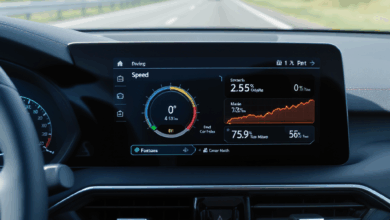Can AI Really Help You Slash Car Insurance Costs? Let’s Find Out Together

Have you ever caught yourself scrolling endlessly through insurance websites, trying to decode confusing jargon and comparing quotes that seem all too similar? I remember the frustration—the sense that no matter how much time I spent, I wasn’t sure if I was really getting the best deal. It felt like chasing a moving target.
Then I stumbled upon something intriguing: AI-powered platforms promising to simplify this hunt by analyzing vast amounts of data in seconds, offering personalized recommendations. Could this be the helper I didn’t know I needed?
Imagine an assistant that compares policies from over 40 insurance carriers, not just listing prices but understanding your driving habits, your vehicle, and even your personal risk factors to find the most cost-effective coverage. That’s exactly what companies like Gabi and Jerry are doing now. They don’t just show you options; some even automate switching your policy, saving you from paperwork headaches.
But it doesn’t stop there. What if your safe driving could actually lower your premium? Insurify and others are using AI to monitor driving behavior in real-time, rewarding responsible drivers with discounts. It’s a shift from the old one-size-fits-all pricing to something much more personal.
Now, you might wonder: is this just a fancy gimmick or a real, practical tool? The promise feels almost too good to be true. Yet, with millions of users turning to these AI-driven services, it seems more than just hype. Still, it’s worth asking—how do these tools fit into our lives? Can we trust them to handle something as important as insurance?
In this article, we’ll explore how AI is transforming the way we find cheap car insurance, share some practical tips on using these technologies, and discuss what this means for us as consumers. If you’ve ever felt lost in the insurance maze or skeptical about AI’s role in personal finance, this journey might offer some fresh perspectives.
So, shall we dive into how AI tools could become your new co-pilot in the quest for affordable car insurance? What questions will this raise about privacy, trust, and the future of insurance itself? Let’s find out together.
When AI Steps Into the Insurance Game: Beyond the Price Tag
I find myself often wondering about the quiet revolution happening beneath our everyday transactions. Take car insurance, for instance—a topic that tends to bore many but affects nearly all of us. The usual dance of collecting quotes, deciphering confusing terms, and hoping for the best has long been the norm. Yet, with AI tools entering the arena, it’s like watching a well-rehearsed play suddenly improvise. But what does that really mean for someone like you or me?
Why Does AI Matter in Finding Cheap Car Insurance?
At first glance, it seems almost magical: AI sifts through mountains of data in moments, crunching numbers to tailor options that fit our unique profiles. But this isn’t just about speed. It’s about personalization and precision in pricing. Platforms like Gabi and Jerry have become the new brokers of this digital age, comparing offerings from over 40 insurance carriers and even automating the switching process—no more drowning in paperwork or losing track of renewal dates.
I discovered that Insurify takes this a step further with predictive modeling, analyzing your driving history and personal data to offer quotes that reflect your actual risk rather than broad assumptions. This approach seems to herald a shift from the cookie-cutter policies of the past to a more nuanced understanding of individual drivers.
Diving Deeper: How Does This AI Magic Work?
It’s not just about crunching prices. Behavior-based insurance models use AI to monitor your driving habits in real-time. Imagine your car or smartphone acting as a vigilant co-pilot, tracking speed, braking patterns, and even cornering behavior. Safe driving becomes rewarded, not just in theory but with tangible discounts on your premiums. This real-time feedback loop might even encourage better driving habits—a win-win, right?
Yet, I can’t help but wonder about the trade-offs. How comfortable are we with this level of surveillance? Does the promise of cheaper insurance justify opening up such a window into our daily routines? These questions linger, inviting us to weigh convenience against privacy.
Practical Steps How Can You Use AI to Find Cheaper Car Insurance?
If this all sounds promising but a bit abstract, here are some actionable ways you can leverage AI today:
-
Start with AI-Powered Comparison Tools: Platforms like Gabi and Jerry are accessible online and mobile-friendly. Input your details, and let the AI scan multiple carriers to find tailored quotes. Remember, it’s not just about the lowest price but the coverage that fits your needs.
-
Consider Behavior-Based Programs: Check if your insurer offers programs that monitor driving habits. Participating could lead to noticeable discounts if you’re a cautious driver. Just be sure to understand what data is collected and how it’s used.
-
Regularly Review Your Policy with AI Assistance: Insurance needs evolve. Use AI tools periodically to reassess and adjust coverage, ensuring you’re not overpaying for unnecessary extras.
-
Stay Updated on AI Developments: The insurance landscape is rapidly changing. Following trusted sources or industry news can alert you to new AI-driven tools or offers.
Navigating the Unknown: What Should We Watch Out For?
While AI’s promise is alluring, it’s important to keep a critical eye. How transparent are these platforms about their algorithms? Could biases influence pricing unfairly? And what happens if the AI makes a mistake—who takes responsibility?
Moreover, the balance between personalized pricing and privacy feels delicate. Would you be willing to share more personal data for potentially lower premiums? And how might this data be protected against misuse?
A Thought to Leave You With
As we step into this AI-assisted future, I invite you to think about your own comfort with technology’s role in personal finance. Could AI truly become a trustworthy partner in managing your car insurance, or is it a double-edged sword demanding vigilant oversight?
What do you think? Are you ready to let AI take the wheel in your insurance journey, or does the idea raise more questions than answers? Perhaps this isn’t just about finding cheap car insurance—it’s about exploring how much of our lives we’re willing to entrust to algorithms.
Let’s keep this conversation going, as the road ahead is anything but straightforward.

Looking back at our exploration of AI’s growing influence on finding cheap car insurance, it’s fascinating to see how technology transforms what once felt like a tedious, bewildering task into a personalized, dynamic experience. Beyond just comparing prices, AI introduces a level of nuance—rewarding safe driving, automating policy management, and tailoring coverage to individual habits—that hints at a future where insurance is more about understanding us than fitting us into broad categories. Yet, this progress also nudges us to reflect on privacy, trust, and the balance we strike between convenience and oversight.
By engaging with AI-powered tools like Gabi, Jerry, or Insurify, you gain not only time and potential savings but also a glimpse into how data-driven personalization can reshape everyday decisions. It’s a chance to reclaim control over your insurance choices while embracing a technology that learns alongside you.
So, why not take the next step? Start by trying an AI-based comparison platform today—feed in your details, see what tailored options emerge, and consider if behavior-based discounts align with your driving habits. Keep reassessing your policy periodically with these tools, and stay curious about how AI continues evolving in this space.
Looking ahead, as AI deepens its role in personal finance, the dialogue between technology and trust will only grow more vital. How will we shape this relationship? What safeguards will emerge? These are questions where your perspective matters.
In the end, perhaps the journey to cheaper car insurance via AI is less about the destination and more about how we navigate change itself. Are we ready to let algorithms become trusted co-pilots, or will we steer cautiously, eyes wide open? Whatever your stance, this conversation is just beginning—let’s keep driving it forward together.
What do you think your next move will be in this evolving landscape?



